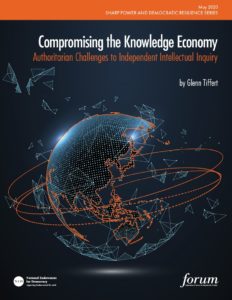
In light of growing concern about malicious disruption during the global crisis, the United Nations’ Open-Ended Working Group (OEWG) is playing a leading role in further developing a common framework for responsible behavior in cyberspace, notes Josh Gold, a research assistant at Citizen Lab, at the University of Toronto’s Munk School. The OEWG is the world’s only intergovernmental forum open to all countries for deliberations on how to ensure a peaceful and secure cyberspace, he writes for the Council on Foreign Relations.
A strongly-worded Dutch paper [PDF] states that “The Netherlands is appalled by the abuse of the COVID-19 crisis by States to conduct or effectively control non-state actors in launching cyber operations.” The Dutch government labels such operations “deplorable examples of irresponsible state behavior,” he adds.
Recent developments in the knowledge economy—intensifying marketization, the rise of online platforms, and populist critiques of the authority and legitimacy of many bodies of knowledge—have impinged upon the robust and open competition of ideas that democratic societies depend on for renewal, according to a new report.
Assaults on intellectual freedom in authoritarian settings start at home, but their reach is increasingly global, analysts Glenn Tiffert writes in “Compromising the Knowledge Economy: Authoritarian Challenges to Independent Intellectual Inquiry,” by the latest in the Sharp Power and Democratic Resilience series, from the NED’s International Forum:
- Regulatory strangulation is shrinking space for academic freedom in countries such as Hungary and Russia, where it has impacted operating licenses or accreditation for universities with links abroad. The Chinese Communist Party under general secretary Xi Jinping has unleashed a sweeping intensification of ideological discipline that has caused the climate for free inquiry and expression in the People’s Republic of China (PRC) to progressively deteriorate.
- When democratic institutions that are integral to an open knowledge economy, such as universities and publishers, partner with entities based in authoritarian states, they expose themselves to perils that traditional due diligence and risk management frameworks were not designed to negotiate. Most fundamentally, these institutions cannot assume that their partners share their core values.
- Authoritarian influence and interference are seeping into the cracks opened by marketization, technological disruption, and inequality, and the COVID-19 pandemic has only heightened the vulnerability of democracies. Responding to this challenge will require a difficult change in mindset equal to the changed environment.

National Endowment for Democracy (NED)
Tiffert explores the compromising effects of sharp power on the civil society institutions that democratic societies depend on for knowledge production, including universities, publishers, and think tanks.







